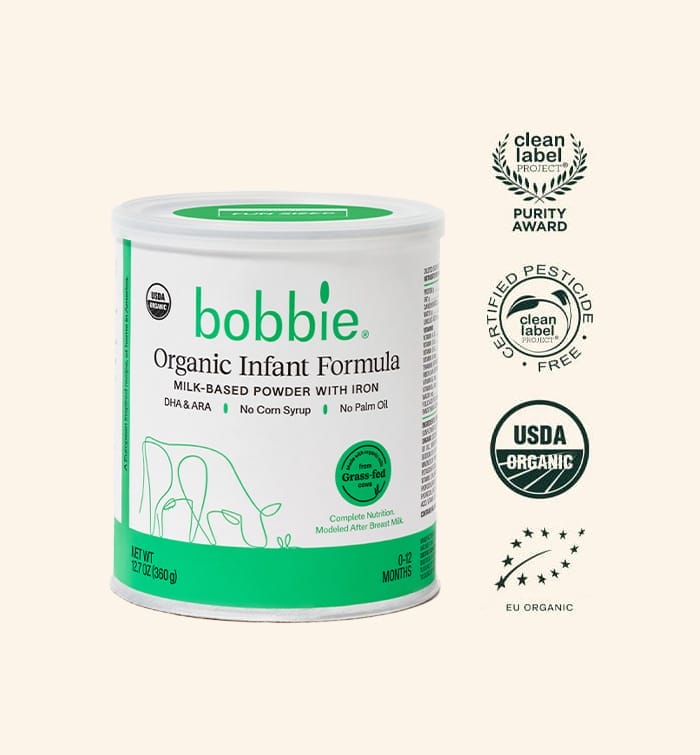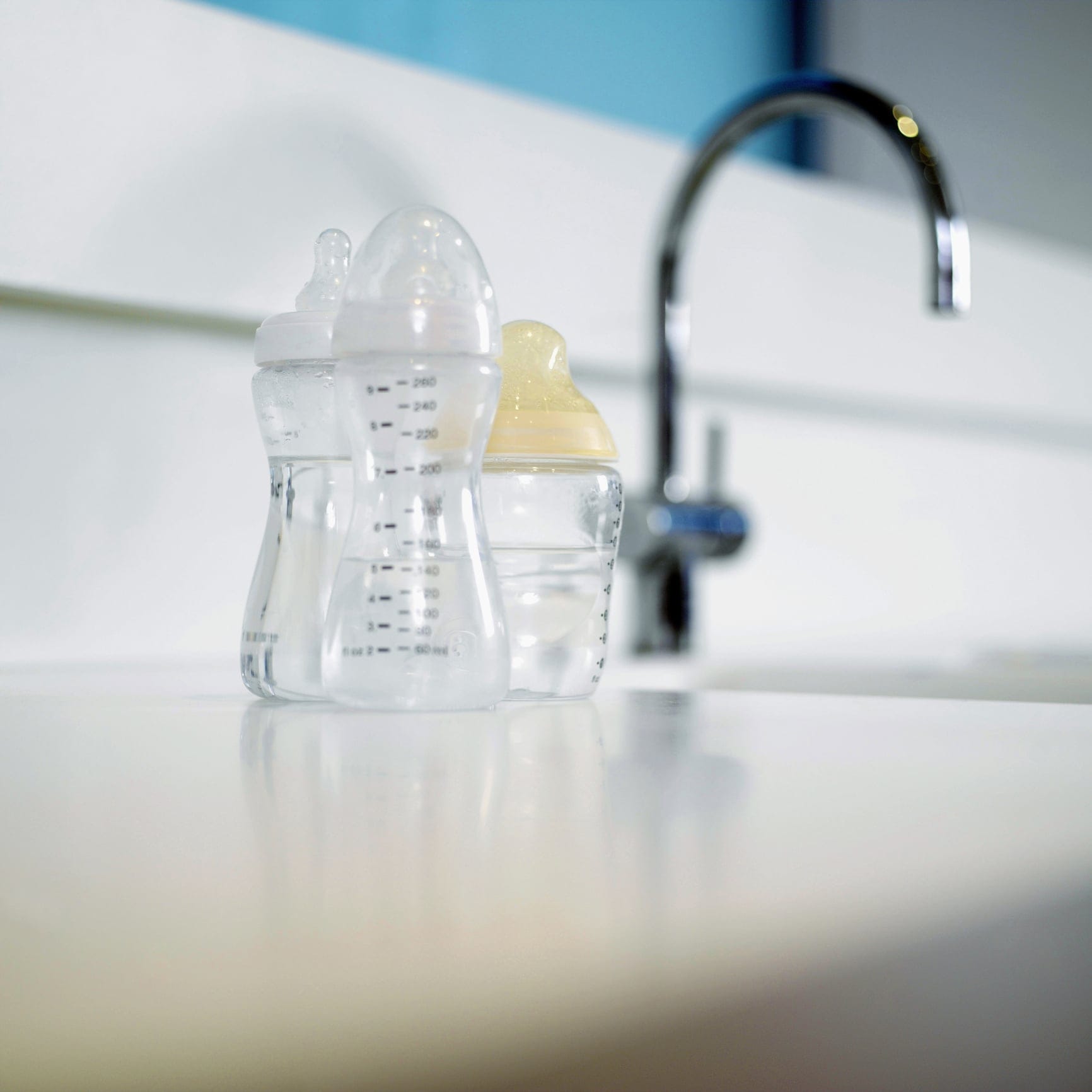We are proud to say that these posts are not sponsored. Our editorial team of Bobbie moms and writers personally select each featured product. If you buy something through our links, we may earn an affiliate commission, at no cost to you.
When it comes to preparing baby formula, it’s normal to have several questions. One common question is, can I use tap water to make infant formula?
In short, yes you can use tap water for infant formula, if your water source is safe. Now, what does “safe” mean, and are there other points to consider? Let’s discuss!
- How to know if tap water is safe for formula
- Should I boil tap water before using it to make infant formula?
- Here’s how to boil water before using it to make infant formula
- Can I use bottled water to make infant formula?
- What about fluoride in water used for baby bottles?
- How to prepare infant formula
- Best water for making a baby bottle
How to know if tap water is safe for formula
If you are not certain that your tap water is safe, it’s important to find out before using it to make formula.1 In order to find out, contact your local health department.
If your home has well water, it should be checked regularly to make sure it’s safe. This may be able to be done through your local health department also.2
Should I boil tap water before using it to make infant formula?
It depends. Many times you don’t need to boil water before using it to make formula. But different factors about your water and your baby might mean that boiling water before making formula is a good idea.
If your baby is very young, was born prematurely or has certain medical issues, using boiled water to make formula may be best for them.
If you have well water or are concerned about the safety of your drinking water, it might be best to boil it before using it to make formula.3
Here’s how to boil water before using it to make infant formula:3,4
- Pour cold tap water into a pan
- Bring the water to a rolling boil on the stove
- Allow the water to boil for 1 minute
- Take the pan off the heat and allow the water to cool for 30 minutes before preparing a bottle
- Once prepared, cool the bottle off by running it under cold tap water or placing it in ice water
- Always test the temperature of the bottle by putting some drops on your wrist before giving it to your baby!
Be sure to talk to your baby’s healthcare provider to discuss whether or not you need to boil your water before using it to make your baby’s bottle.
Can I use bottled water to make infant formula?
Good question! There are a few things to consider if you’re thinking about using bottled water to make infant formula.
Bottled water may not be sterile and can become contaminated over time if it’s not used, so be sure to check any expiration dates on bottled water. You can consider using bottled baby or nursery water, which is often boiled before bottling.2
It’s important to know that tap water often contains fluoride and bottled water usually does not. Fluoride helps make teeth strong and prevents cavities, so it’s important for babies over 6 months old since this is when teeth start to emerge.5
What about fluoride in water used for baby bottles?
While babies less than 6 months old don’t need water with fluoride, it is safe to use water with fluoride for these younger babies.5 Since fluoride is important for healthy teeth, if you are exclusively breastfeeding, using ready-to-feed formula or making powdered or liquid concentrate formula using water without fluoride, your baby’s healthcare provider may prescribe them a fluoride supplement.6
One risk of using water with fluoride to prepare infant formula is your baby developing fluorosis, or faint white lines on their teeth. This is usually very mild, not painful and not bad for their teeth. Once a child starts getting adult teeth (around age 8), this is no longer a risk.5
How to prepare infant formula
Whether you use tap water, bottled water, or boiled water, the steps of formula preparation are always the same once you have your water ready. Follow the instructions above for boiling water if needed. If you’re using water right from the tap, be sure to only use cold water and run the tap for 1 minute before using the water. This is to avoid lead exposure from pipes.
Here’s how to make a formula bottle:4
- Make sure to always read the instructions on the formula container first so you can be sure to use the right amount of water and formula
- Add water to the bottle before powder or liquid concentrate
- Shake the bottle well to mix
- If you want to warm the bottle, run it under warm water or place it in a bowl of warm water (never use the microwave!)
- Always test the temperature of the bottle by putting some drops on your wrist before giving it to your baby!
- Throw out any formula your baby doesn’t finish from their bottle after 1 hour

Shop Bobbie Organic Infant Formula
Bobbie Organic Infant Formula is a USDA Organic, EU-style infant formula that meets all FDA requirements. It is a complete nutrition milk-based powder modeled after breast milk and is easy on tummies. It is non-GMO and doesn't have corn syrup, palm oil, or maltodextrin. Learn more about Bobbie.
Best water for making a baby bottle
When it comes to preparing infant formula, safety is a priority. This is why so many parents wonder which kind of water is best for making infant formula.
Tap water is often safe, and if you aren’t sure about your tap water ask your baby’s healthcare provider or your local health department. Well water needs to be checked regularly.
Bottled water may be an option, but it’s important to consider what kind of bottled water and how long it’s been on the shelf.
Fluoride is important to prevent cavities, but too much can cause mild white stains on teeth called fluorosis. Be sure to talk with your baby’s healthcare provider about the type of water you’re using to make bottles and whether or not it has enough fluoride to meet your baby’s needs. If it doesn’t, your baby may need a fluoride supplement once they’re 6 months old.
Most importantly, no matter which kind of water you end up using, be sure to follow the instructions on the formula container to ensure you are mixing formula correctly every time so your baby gets the nutrition they need! And if you’re wondering if you need to warm up those bottles, here is a story on best temperature for baby bottles.

Shop Bobbie Organic Infant Formula
Bobbie Organic Infant Formula is a USDA Organic, EU-style infant formula that meets all FDA requirements. It is a complete nutrition milk-based powder modeled after breast milk and is easy on tummies. It is non-GMO and doesn't have corn syrup, palm oil, or maltodextrin. Learn more about Bobbie.
Sources:
1- Infant formula preparation and storage | Centers for Disease Control and Prevention
2- Feeding your infant: how to prepare and store baby formula | Cleveland Clinic
3- Formula feeding FAQs: preparation and storage | Nemours Kids Health
4- How to prepare formula for bottle-feeding at home | World Health Organization
5- Fluoride for children FAQs | American Academy of Pediatrics
6- Infant formula: 7 steps to prepare it safely | Mayo Clinic
7- Bottle-feeding (formula) questions | Seattle Children’s

